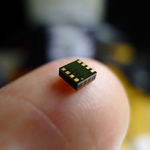
 Startup Founded by Researchers From UC Davis and UC Berkeley Acquired by TDK...
Startup Founded by Researchers From UC Davis and UC Berkeley Acquired by TDK... 
Evolve BioSystems, Inc., a spin-off from the UC Davis Foods for Health Institute (FFHI) that is developing novel solutions to restore and maintain a healthy newborn gut microbiome, announced findings from new research that connects elevated infant fecal pH levels to a change in the infant gut microbiome. Their release states that over the past 100 years, the average pH of a baby’s stool, which can indicate the type of bacteria in the baby’s gut, has undergone an alarming increase from pH 5.0 to 6.5. The study, published in the American Society for Microbiology journal mSphere, connects this rise in pH to a generational loss of Bifidobacterium, a critical gut bacteria during infancy, and an accompanying increase in a number of harmful bacteria.
The team reviewed 14 clinical studies published between 1926 and 2017, identifying a change in pH from 5.0 to 6.5 over this time period. The authors attributed this trend to an observed reduction of Bifidobacterium in the infant gut, along with an increase in potentially harmful bacteria such as E. coli and Clostridia, resulting in “dysbiosis”, a potentially detrimental imbalance of the gut microbial ecosystem.
Evolve’s founding team, which includes UC Davis faculty members Bruce German, David Mills, Carlito Lebrilla and Daniela Barile, along with former FFHI Assistant Director Samara Freeman, has been conducting research at the forefront of infant nutritional health for over a decade, focusing on the key role that breast milk plays in creating a healthy intestinal tract.
The full release can be found here.

 Startup Founded by Researchers From UC Davis and UC Berkeley Acquired by TDK...
Startup Founded by Researchers From UC Davis and UC Berkeley Acquired by TDK... 